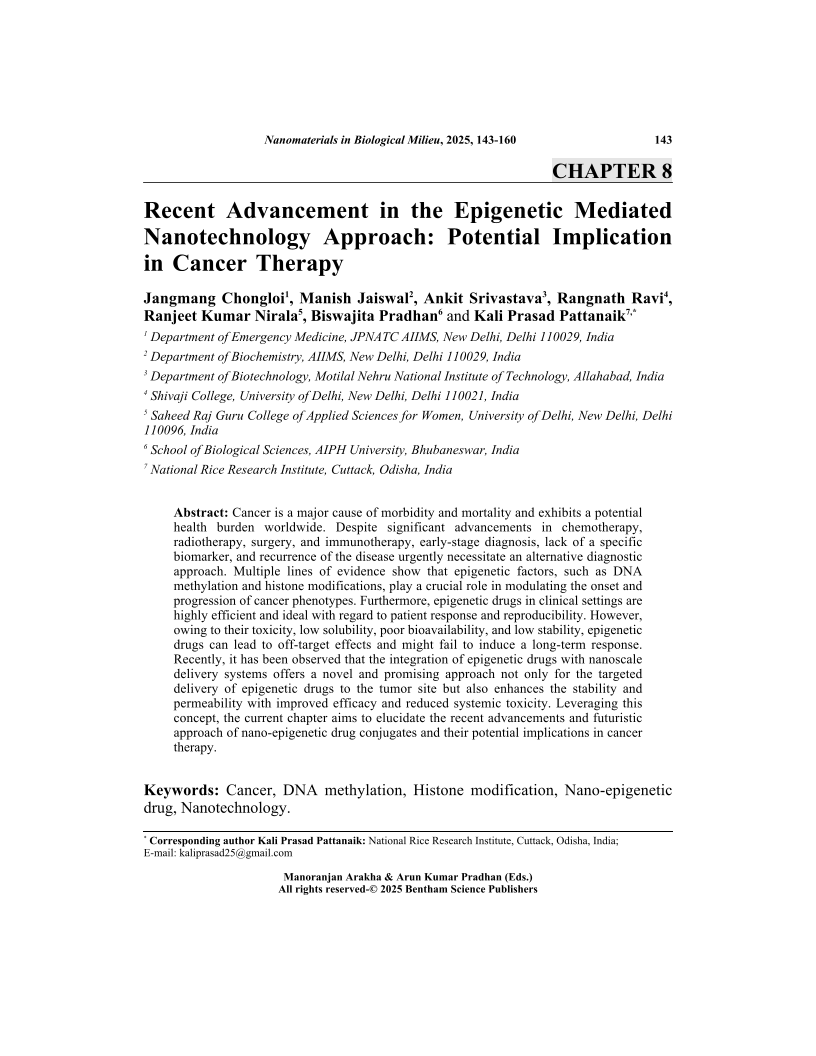Recent Advancement in the Epigenetic Mediated Nanotechnology Approach: Potential Implication in Cancer Therapy

- Authors: Jangmang Chongloi1, Manish Jaiswal2, Ankit Srivastava3, Rangnath Ravi4, Ranjeet Kumar Nirala5, Biswajita Pradhan6, Kali Prasad Pattanaik7
-
View Affiliations Hide Affiliations1 Department of Emergency Medicine, JPNATC AIIMS, New Delhi, Delhi 110029, India 2 Department of Biochemistry, AIIMS, New Delhi, Delhi 110029, India 3 Department of Biotechnology, Motilal Nehru National Institute of Technology, Allahabad, India 4 Shivaji College, University of Delhi, New Delhi, Delhi 110021, India 5 Saheed Raj Guru College of Applied Sciences for Women, University of Delhi, New Delhi, Delhi 110096, India 6 School of Biological Sciences, AIPH University, Bhubaneswar, India 7 National Rice Research Institute, Cuttack, Odisha, India
- Source: Nanomaterials in Biological Milieu: Biomedical Applications and Environmental Sustainability , pp 143-160
- Publication Date: June 2025
- Language: English
Recent Advancement in the Epigenetic Mediated Nanotechnology Approach: Potential Implication in Cancer Therapy, Page 1 of 1
< Previous page | Next page > /docserver/preview/fulltext/9789815313260/chapter-8-1.gif
Cancer is a major cause of morbidity and mortality and exhibits a potential health burden worldwide. Despite significant advancements in chemotherapy, radiotherapy, surgery, and immunotherapy, early-stage diagnosis, lack of a specific biomarker, and recurrence of the disease urgently necessitate an alternative diagnostic approach. Multiple lines of evidence show that epigenetic factors, such as DNA methylation and histone modifications, play a crucial role in modulating the onset and progression of cancer phenotypes. Furthermore, epigenetic drugs in clinical settings are highly efficient and ideal with regard to patient response and reproducibility. However, owing to their toxicity, low solubility, poor bioavailability, and low stability, epigenetic drugs can lead to off-target effects and might fail to induce a long-term response. Recently, it has been observed that the integration of epigenetic drugs with nanoscale delivery systems offers a novel and promising approach not only for the targeted delivery of epigenetic drugs to the tumor site but also enhances the stability and permeability with improved efficacy and reduced systemic toxicity. Leveraging this concept, the current chapter aims to elucidate the recent advancements and futuristic approach of nano-epigenetic drug conjugates and their potential implications in cancer therapy.
-
From This Site
/content/books/9789815313260.chapter-8dcterms_subject,pub_keyword-contentType:Journal -contentType:Figure -contentType:Table -contentType:SupplementaryData105

